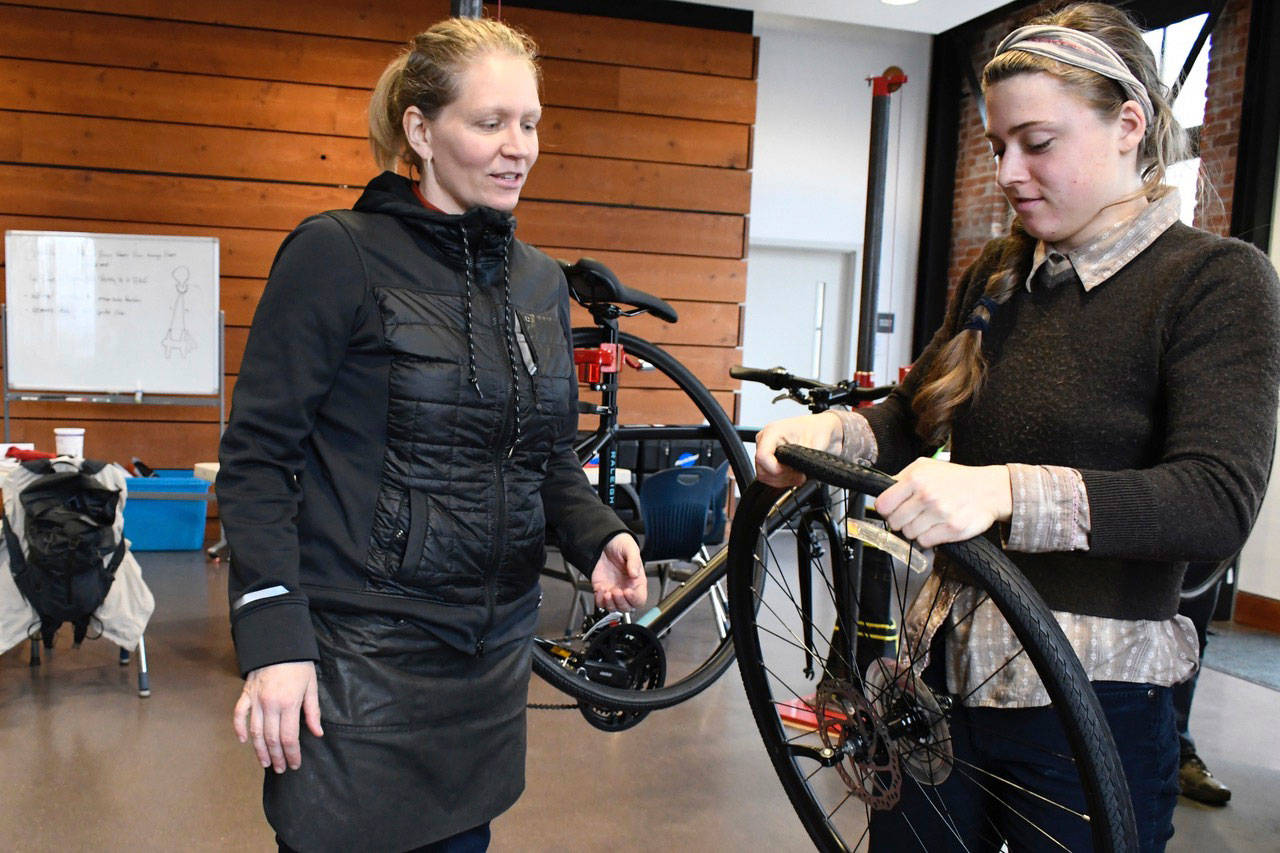PORT TOWNSEND — A dozen students put their mettle to their pedals, frames and wheels last week at the Cotton Building as they learned basic bicycle mechanics.
The Level 1 class, a milestone for the new Port Townsend Cycle School, was co-taught by master mechanic Tori Bortman of Gracie’s Wrench in Portland, Ore., and locally based wheel-building expert and school co-founder Ric Hjertberg.
Men and women learned maintenance, repair, restoration and assembly of bicycles in five days and rode off with a certificate. The private school officials said the instruction was the first certified class held in Washington state.
“Statistically, 70 percent of riders are men, but women are eager to learn and we end up with a 50-50 split in the classes,” Bortman said.
She teaches repair and maintenance classes in her shop in Portland, and encourages cycling as part of one’s lifestyle.
Bortman and Hjertberg were teaching the inaugural class of eager students the basics of what they would need to work in a bike shop as a career — “not necessarily to be a pro mechanic,” Bortman said, ”but the beginnings of what you might need, and definitely what you would need to know as a home mechanic.
“This class is the first step to build on.”
Students were familiarized with every part and aspect of a bike.
“We started with brakes, and worked our way through changing cables, shifting, derailleurs, bearings, frames, wheels and how to take parts on and off,” Bortman said.
She said woven into the curriculum was a segment on shop etiquette and how to deal with customers in ways that are respectable.
“The cycling industry can be intimidating,” she said. “We are only doing ourselves a disservice as an industry to not encourage customers to come and feel safe, to feel as though they can ask questions and be respected.”
The school has plans to offer a two-week, level two comprehensive course to prepare students for a job in the field. Hjertberg offers two wheel building classes at the school that round out the current curriculum.
Nationwide, there is no recognized standard for bicycle mechanic certification. Bortman said there are only a couple schools that have worked hard to make their reputations well-known.
“Everyone knows mechanics coming out of those classes have a really good knowledge base,” she said.
“Rik is one of the people working with the Professional Bicycle Mechanics Association to create that standard and it’s coming in the next few years,” she explained. “The Port Townsend Cycle School is poised to work to that standard so people can walk away from the course and go to a bike shop and say they have that certification.”
Student Tedi Beck said she “would love to become a bike mechanic.”
She said she learned that bikes are “very custom and the more you can understand how to build a bike, the more you can build it to your own preferences. I find that really cool.”
Bortman has seen a steady increase in the number of people riding bikes.
“A lot more people are getting out of their cars in general, she said. “ Whether it is on a scooter or a bicycle, bike shares are growing. In reality, there are more people in the world and cities are becoming more dense. There is less room for cars and parking.
“We’ll hit a critical mass and then there will be more cyclists.”
The fastest growing segment of bike sales is in the electric market and Bortman said electric bikes already have taken over Europe.
“The number one selling bike of any kind today is an electric one. When people here figure that out — all it takes is riding one once.
“When people start moving on one, their face breaks out into a child-like joyous grin because it’s that much fun,” she said.
“It takes that part about ‘I’m going to get sweaty or I’m not as fast as everybody else,’ away. It’s gone. It’s a great equalizer of everyone on a bicycle. I think once people figure that out, it will be the shift away from motor vehicles.”
One problem has been that electric bikes have been so expensive in the past that people couldn’t afford them.
“You could buy a bike or a used car. Now prices have dropped dramatically for quality electric bikes and newer technology. As prices continue to drop, I think we’ll start hearing the conversation: ‘Why do we need to be a two-car family. Why don’t we buy a car and a cargo e-bike.
“We are going to spend $1,500 on an e-bike and not $15,000 on a car. I don’t think the car in the U.S. will ever go away. We are just too geographically big as a country. But for commuting and errands in towns like Port Townsend, it makes sense.”
Bortman said certificates were presented to students at the end of the class Friday.
“Our goal is to help people who are interested in working in the field and owning a bike shop to have a wide swath of information and be proficient in the basics,” she said. “That pro certificate is coming.”
The cost of the school was $1,000, with scholarships also provided.
For more information about the Port Townsend Cycle School, see https://www.ptcycleschool.org/.
________
Jefferson County Editor/Reporter Jeannie McMacken can be reached at 360-385-2335 or at jmcmacken@peninsuladailynews.com.

